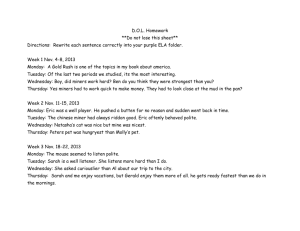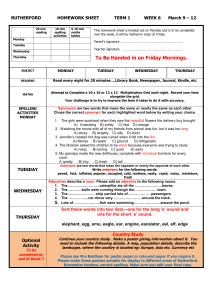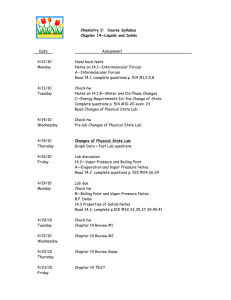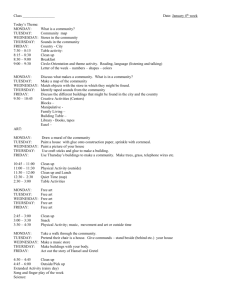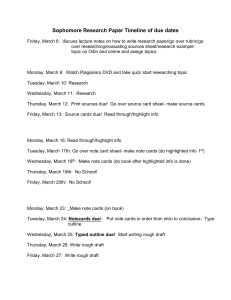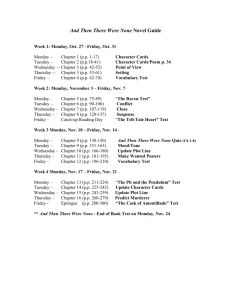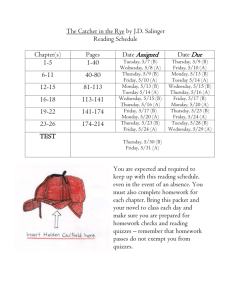World Civilization-A Scope and Sequence
advertisement
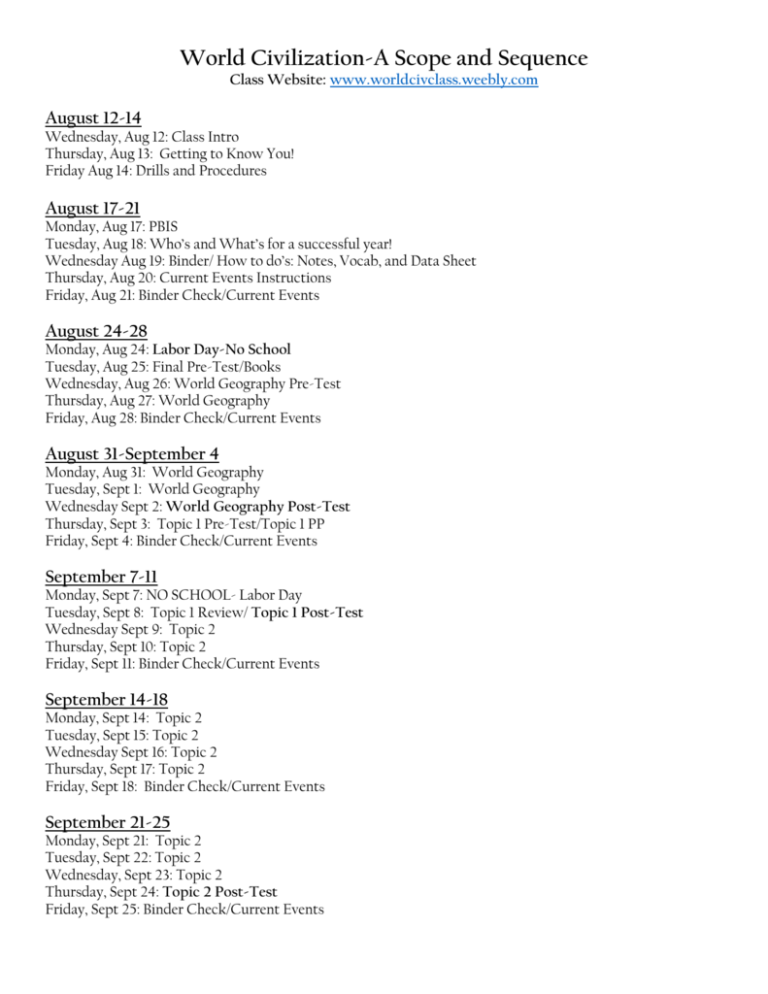
World Civilization-A Scope and Sequence Class Website: www.worldcivclass.weebly.com August 12-14 Wednesday, Aug 12: Class Intro Thursday, Aug 13: Getting to Know You! Friday Aug 14: Drills and Procedures August 17-21 Monday, Aug 17: PBIS Tuesday, Aug 18: Who’s and What’s for a successful year! Wednesday Aug 19: Binder/ How to do’s: Notes, Vocab, and Data Sheet Thursday, Aug 20: Current Events Instructions Friday, Aug 21: Binder Check/Current Events August 24-28 Monday, Aug 24: Labor Day-No School Tuesday, Aug 25: Final Pre-Test/Books Wednesday, Aug 26: World Geography Pre-Test Thursday, Aug 27: World Geography Friday, Aug 28: Binder Check/Current Events August 31-September 4 Monday, Aug 31: World Geography Tuesday, Sept 1: World Geography Wednesday Sept 2: World Geography Post-Test Thursday, Sept 3: Topic 1 Pre-Test/Topic 1 PP Friday, Sept 4: Binder Check/Current Events September 7-11 Monday, Sept 7: NO SCHOOL- Labor Day Tuesday, Sept 8: Topic 1 Review/ Topic 1 Post-Test Wednesday Sept 9: Topic 2 Thursday, Sept 10: Topic 2 Friday, Sept 11: Binder Check/Current Events September 14-18 Monday, Sept 14: Topic 2 Tuesday, Sept 15: Topic 2 Wednesday Sept 16: Topic 2 Thursday, Sept 17: Topic 2 Friday, Sept 18: Binder Check/Current Events September 21-25 Monday, Sept 21: Topic 2 Tuesday, Sept 22: Topic 2 Wednesday, Sept 23: Topic 2 Thursday, Sept 24: Topic 2 Post-Test Friday, Sept 25: Binder Check/Current Events September 28-October 2 Monday, Sept 28: Topic 3 Tuesday, Sept 29: Topic 3 Wednesday Sept 30: Topic 3 Thursday, Oct 1: Topic 3 Post-Test Friday, Oct 2: Binder Check/Current Events October 5-9 Monday, Oct 5: Topic 5 Tuesday, Oct 6: Topic 5 Wednesday Oct 7: Topic 5 Thursday, Oct 8: Topic 5 Friday, Oct 9: Binder Check/Current Events October 12-16 Monday, Oct 12: Topic 5 Post-Test Tuesday, Oct 13: Topic 6 Wednesday Oct 14: Topic 6 Thursday, Oct 15: Topic 6 Friday, Oct 16: (End of the 1st grading period) Binder Check/Current Events October 19-23 Monday, Oct 19: Topic 6 Tuesday, Oct 20: Topic 6 Wednesday Oct 21: Topic 6 Thursday, Oct 22: Topic 6 Friday, Oct 23: Binder Check/Current Events October 26-30 Monday, Oct 26: Topic 6 Post-Test Tuesday, Oct 27: Topic 7 Wednesday, Oct 28: Topic 7 Thursday, Oct 29: NO SCHOOL-FALL BREAK Friday, Oct 30: NO SCHOOL-FALL BREAK November 2-6 Monday, Nov 2: Topic 7 Tuesday, Nov 3: Topic 7 Wednesday, Nov 4: Topic 7 Thursday, Nov 5: Topic 7 Post-Test Friday, Nov 6: Binder Check/Current Events November 9-13 Monday, Nov 9: Topic 8 Tuesday, Nov 10: Topic 8 Wednesday, Nov 11: Topic 8 Thursday, Nov 12: Topic 8 Post-Test Friday, Nov 13: Binder Check/Current Events November 16-20 Monday, Nov 16: Topic 9 Tuesday, Nov 17: Topic 9 Wednesday, Nov 18: Topic 9 Thursday, Nov 19: Topic 9 Post-Test Friday, Nov 20: Binder Check/Current Events November 23-27 Monday, Nov 23: Topic 10 Tuesday, Nov 24: Topic 10 Wednesday, Nov 25: NO SCHOOL-THANKSGIVING BREAK Thursday, Nov 26: NO SCHOOL-THANKSGIVING BREAK Friday, Nov 27: NO SCHOOL-THANKSGIVING BREAK November 30-December 4 Monday, Nov 30: Topic 10 Tuesday, Dec 1: Topic 10 Wednesday, Dec 2: Topic 10 Thursday, Dec 3: Topic 10 Post-Test Friday, Dec 4: Binder Check/Current Events December 7-11 Monday, Dec 7: Topic 4 & 11 Tuesday, Dec 8: Topic 4 & 11 Wednesday, Dec 9: Topic 4 & 11 Thursday, Dec 10: Topic 4 & 11 Post-Test Friday, Dec 11: Binder Check/Current Events December 14-18 Monday, Dec 14: Topic 12 Tuesday, Dec 15: Topic 12 Wednesday, Dec 16: FINAL REVIEW Thursday, Dec 17: FINALS Friday, Dec 18: (End of the 1st Semester) FINALS All Dates and Topics are subject to change! Indiana State Standards Standard 1: Ancient Cultures and Civilizations: 8000 to 600 BCE Students examine the movement toward civilization, including those of North Africa, Southwest Asia, South Asia and East Asia from 8000 to 600 CE. Standard 2: Classical Civilization: 1000 BCE to 600 CE Students explore the classical civilizations of the Mediterranean, Southwest Asia, South Asia, East Asia, and the Americas from 1000 to 600 CE Standard 3: Major Civilizations and Cultural Interactions: 600 to 1300 CE Students trace the development and interactions of major civilizations and empires in different regions of the world from 600 to1300 CE. Standard 4 —The Rise of Western Civilization and Global Interaction: 1300 to 1750 CE Students explore the rise of Europe and its consequences for worldwide exploration and colonization from 1300 to 1750 CE. Standard 5 - Revolutions, Nationalism, and Imperial Power: 1500 to 1900 CE Students examine the causes, events, and global consequences of intellectual, economic, social, and political movements and revolutions from 1500 to 1900 CE (Covered in WC-B) Standard 6 - An Era of Global Conflicts, Challenges, Controversies, and Changes: 1900 CE to the Present Students analyze and explain trends and events of global significance, such as world wars, international controversies and challenges, and cross-cultural changes which have influenced our modern world. (Covered in WC–B) Standard 7 — Historical Thinking Students conduct historical research that incorporates information literacy skills such as forming appropriate research questions; evaluating information by determining accuracy, relevance and comprehensiveness; interpreting a variety of primary and secondary sources; and presenting their findings with documentation. Standards According to Topics Covered: TOPIC 1: Origins of Civilizations WH.1.1 Describe and evaluate social, cultural, and economic changes of small agriculture communities which led to the development of large agricultural settlements such as the movement from hunting and gathering societies to civilization. (Economics, Geography) WH.1.2 Identify the key components that make up a civilization and the key differences between civilizations and other forms of social organization. (Geography, Sociology) TOPIC 2: Ancient Middle East and Egypt WH.1.3 Review the key elements of the development of early river valley civilizations in Mesopotamia, Egypt, the Indus River Valley, and Shang China. (Geography, Sociology) WH.2.1 Review the development and key concepts of major world religions and philosophies including Hinduism, Buddhism, Judaism, Christianity, and Islam. (Sociology) WH.2.2 Examine the development of Judaism and the civilization of Ancient Israel, including the origins of monotheism, the significance of the Exodus from Egypt, the Hebrew Bible and the Ten Commandments as the source of many moral and ethical traditions of Western civilization. TOPIC 3: Ancient India and China WH.1.4 Examine the development and characteristics of early empires such as Assyria, Persia, Israel, Minoan, and Zhou. (Geography, Sociology) WH.2.1 Review the development and key concepts of major world religions and philosophies including Hinduism, Buddhism, Judaism, Christianity, and Islam. (Sociology) WH.2.10 Trace the development and major achievements of civilizations in India such as the Mauryan and Gupta empires. (Geography, Sociology) WH.2.11 Compare and contrast the influence of Hinduism and Buddhism on civilization in India and Buddhism’s spread throughout Asia. (Psychology, Sociology) WH.3.1 Analyze the impact of trade networks such as the Silk Road and Indian Ocean trade network. TOPIC 5: Ancient Greece WH.2.3 Examine the development of Greek civilization including differing political and social structures as well as conflicts such as the Persian and Peloponnesian wars. (Sociology, Economics, Government, Geography) WH.2.4 Describe the rise of Alexander the Great and the influence of Hellenism in Southwest and South Asia, North Africa, and parts of Europe. WH.2.9 Examine the significant achievements of the Greeks and Romans and their impact on the modern world. (Individuals, Society and Culture) TOPIC 6: Ancient Rome and Origins of Christianity WH.2.5 Analyze the development of Roman Republican government and society. (History, Government, Sociology) WH.2.6 Trace the changes that culminated in the end of the Republic and the formation of the Roman Empire. WH.2.7 Examine the origins, rise, and spread of Christianity including the life of Jesus, and Christianity’s impact on the Roman Empire. (Sociology) WH.2.9 Examine the significant achievements of the Greeks and Romans and their impact on the modern world. (Individuals, Society and Culture) WH.3.2 Explain the rise and achievements of the Byzantine Empire. WH.3.3 Explain the division between the Eastern and Western branches of Christianity as a result of the Great Schism of 1054. WH.3.7 Describe the rise and achievements of Charlemagne and the birth of the Holy Roman Empire. WH.3.8 Analyze the consequences of the fall of the Western Roman Empire and the development of feudalism and manorialism on Europe. TOPIC 7: Medieval Christian Europe WH.2.8 Analyze the causes, conditions, and consequences of the decline and fall of the western part of the Roman Empire. WH.3.6 Explain the role of Christianity as a unifying force in medieval Europe. WH.3.9 Explain the cultural, political and religious causes of the Crusades and their consequences for Europe and Southwest Asia, including the growth in power of the monarchies in Europe. WH.3.10 Describe the improvements in agriculture, the growth of towns, and the commercial revival during the Middle Ages. TOPIC 8: Muslim World and Africa WH.3.4 Examine the origins, rise, and spread of Islam including the life of Muhammad, and Islam’s division into the Sunnis and Shiites.. WH.3.5 Trace the spread of Islam and its impact throughout Southern Europe, Northern Africa and Asia. WH.3.11 Examine the key achievements of civilizations in Africa prior to European contact. TOPIC 9: Civilizations of Asia WH.2.12 Compare and contrast the influence of Confucianism, Taoism, and Legalism on East Asian civilizations. (Sociology) WH.2.13 Trace the developments and achievements of the Qin and Han Dynasties. (Government, Sociology) WH.3.13 Explain and understand the achievements of the Tang and Song Dynasties. WH.3.14 Describe and explain the rise, expansion and decline of the Mongol Empire and its consequences for Eurasian peoples. WH.3.15 Examine the development of feudalism in Japan and its impact on Japanese society and government. WH.4.7 Trace the development of the gunpowder empires such as the Ottoman, Mughal, and Ming empires and their reaction to Western interaction. TOPIC 10: Renaissance and Reformation WH.4.1 Trace the origins and developments of the European Renaissance and its impact throughout Western Europe. WH.4.2 Analyze the factors that led to the rise and spread of the Protestant Reformation, the Catholic Counter Reformation, as well as reforming movements in other religions, including the wars of religion. TOPIC 4 & 11: Americas & New Global Connections WH.3.12 Compare and contrast the developments and achievements of the Maya, Aztec and Inca civilizations. WH.4.3 Discuss the emergence of nationalism and nation-states as well as the increased impact of the citizen as a result of the decline of the European medieval period. WH.4.4 Explain the causes of the worldwide voyages of exploration. WH.4.5 Explain consequences of the conquests and colonization as a result of the worldwide voyages of exploration including the transatlantic slave trade, Columbian Exchange, and the effects on native populations in the Americas. WH.4.6 Examine the growth and development of the European economic system as a result of exploration and the growth of mercantilism. TOPIC 12: Absolutism and Revolutions WH.4.8 Trace the development and impact of absolute monarchies in Europe. WH.4.9 Describe the progression of events in England that led to constitutional monarchy such as the Magna Carta, the English Civil War, and the Glorious Revolution of 1688. Standard 7: Covered throughout all topics. WH.7.1 Identify patterns of historical change and duration and construct a representation that illustrates continuity and change. WH.7.2 Locate and analyze primary sources and secondary sources related to an event or issue of the past. WH.7.3 Investigate and interpret multiple causation in analyzing historical actions and analyze cause-and-effect relationships. WH.7.4 Explain issues and problems of the past by analyzing various interests and viewpoints of the participants involved. WH.7.5 Use technology in the process of conducting historical research and to present products of historical research. WH.7.6 Formulate and present a position or course of action on an issue by examining the underlying factors contributing to that issue and support that position.
